Excavation Contractors Denver
Find the best Excavation Contractors Near Me in Denver
Receive up to 3 Land Excavation quotes for your project today! Compare profiles, reviews, accreditations, portfolio, etc... and choose the best service.
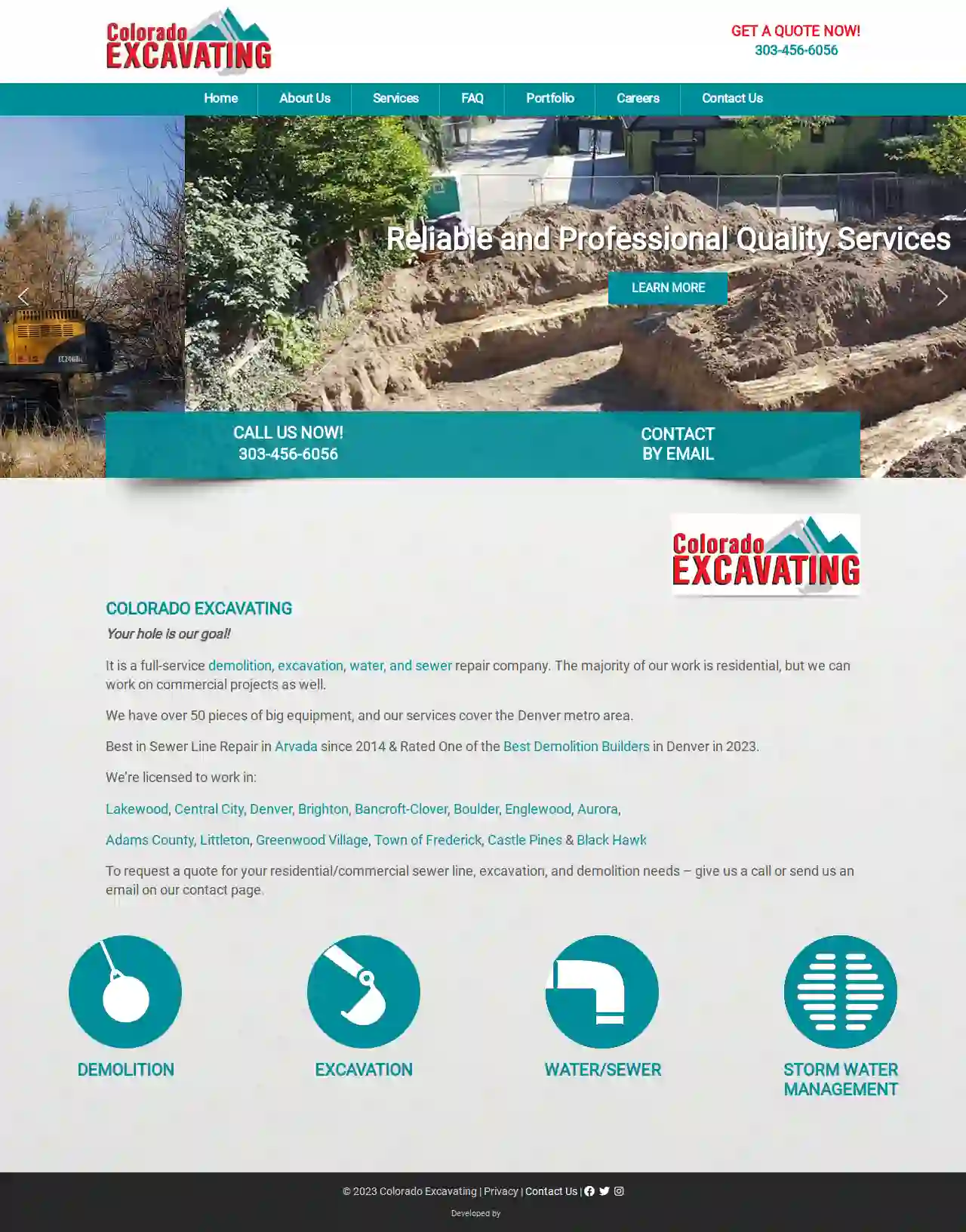
Colorado Excavating
4.332 reviewsDenver, USColorado Excavating: Your Hole is Our Goal! Colorado Excavating is a full-service demolition, excavation, water, and sewer repair company. We primarily serve residential clients, but we also handle commercial projects. With over 50 pieces of heavy equipment, we provide services throughout the Denver metro area. We've earned a reputation for excellence, being recognized as one of the best demolition builders in Denver in 2023 and the top choice for sewer line repair in Arvada since 2014. Our licensed service areas include: Lakewood Central City Denver Brighton Bancroft-Clover Boulder Englewood Aurora Adams County Littleton Greenwood Village Town of Frederick Castle Pines Black Hawk For all your residential and commercial sewer line, excavation, and demolition needs, contact us for a free quote. You can reach us by phone or email through our contact page.
- Services
- Why Us?
- Gallery
Get Quote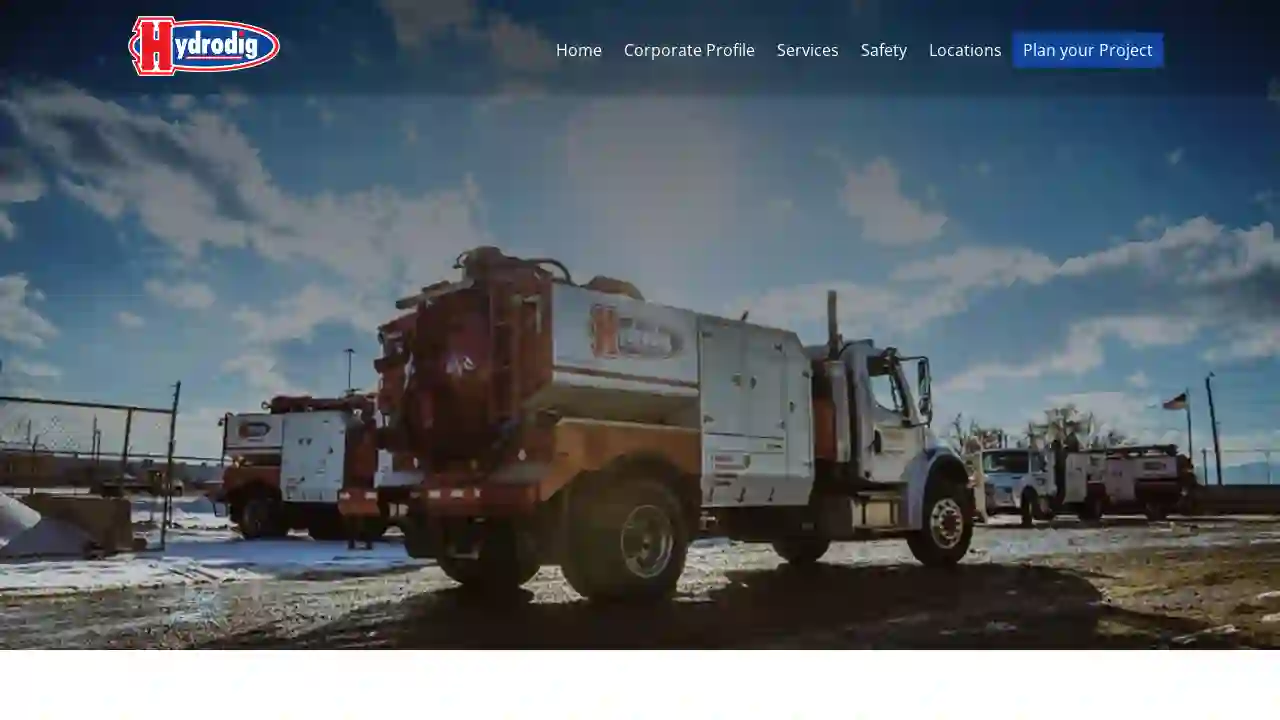
Hydrodig of Denver
4.418 reviews4410 50 St., Bentley, T0C 0J0, USWho is Hydrodig? Incorporated in 1997 and commencing hydro-excavating activities in the spring of 1998, Hydrodig™ has become one of North America’s leading hydrovac companies with Canadian service locations in British Columbia, Alberta, Saskatchewan and Ontario as well as with USA locations in Denver, CO and Dallas, TX. Hydrodig™ undertook initial Western Canada expansion in 2000 with the creation of an owner / operator network of hydrovac service providers. In 2009, Hydrodig™ created its first international entity, Hydrodig™ USA LLC. With locations from Vancouver BC to Ottawa ON and the exposure in the USA, Hydrodig™ can provide safe, efficient, and cost effective solutions to any excavation project with our unique single axle, 4×4 hydro-excavating units. What Is Hydro-Excavation? Numerous terms are associated with this activity: potholing, daylighting, hydro-trenching, hydrovacing and non-destructive excavating to name a few. What is Hydro-Excavation? Simply put, hydro-excavation is the process of utilizing high-pressure water and a powerful vacuum system to excavate. A high pressure water stream loosens the earth and other debris while simultaneously removing and storing the slurry within the onboard vacuum system. This precision orientated activity is predominately used to expose underground infrastructure while determining/proving its precise location OR its non-existence within a proposed excavation area. What is Hydro-Excavation? All in a safe, non-destructive fashion. Examples of underground infrastructure include oil and gas pipelines, water pipelines, sewer pipelines, fiber optic cables, electrical cables, and other utilities.
- Services
- Why Us?
- Gallery
Get Quote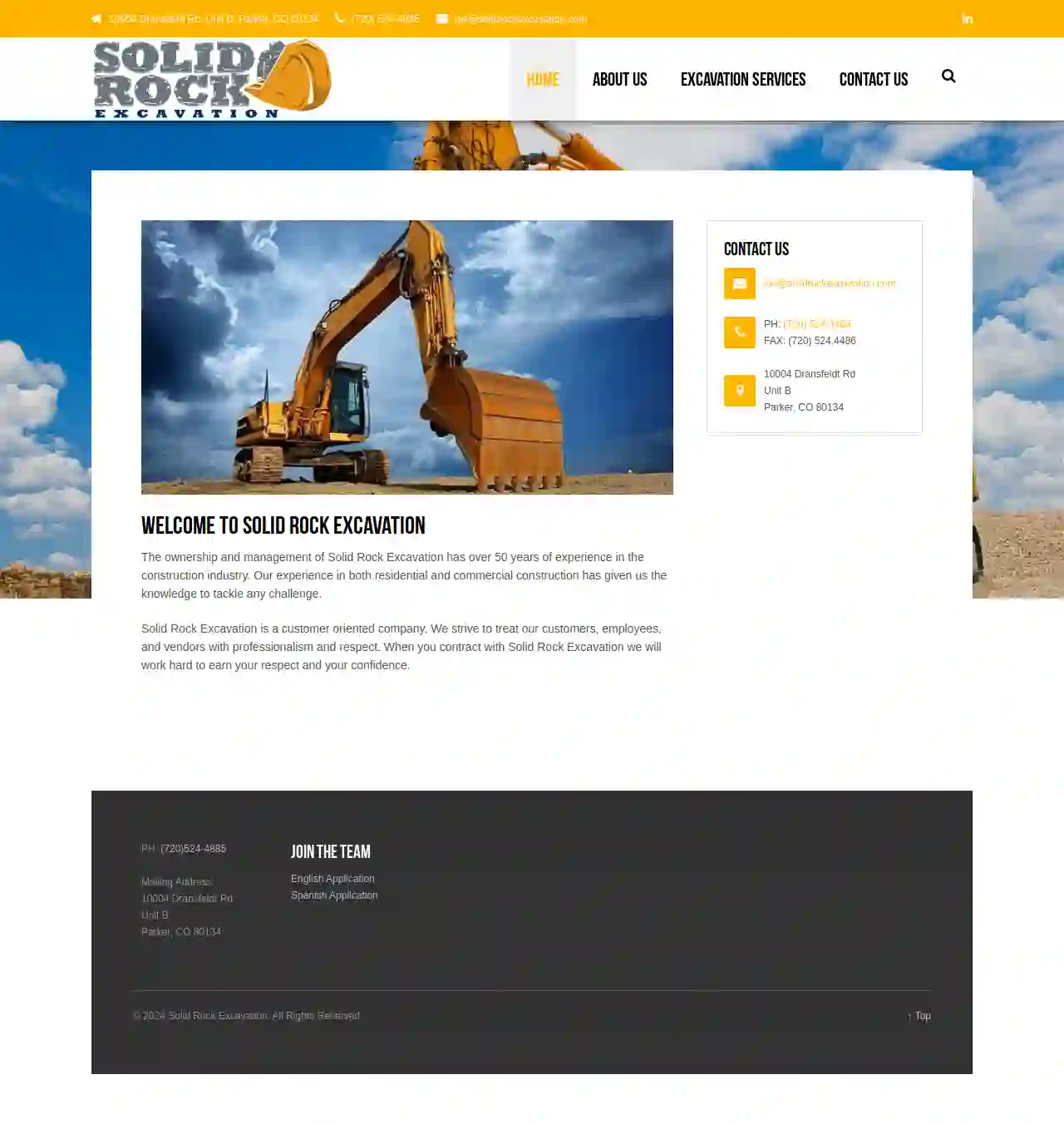
Solid Rock Excavation
54 reviews10004 Dransfeldt Rd, Unit B, Parker, 80134, USSolid Rock Excavation: Building on a Foundation of Experience and Integrity Solid Rock Excavation is a customer-oriented company with a rich history in the construction industry. Founded by Joe Chupp, who boasts over 50 years of experience in both residential and commercial construction, Solid Rock brings a wealth of knowledge and expertise to every project. Joe's dedication to quality, integrity, and honesty is reflected in every aspect of the company's operations. At Solid Rock, we believe in building strong relationships with our customers, employees, and vendors. We strive to treat everyone with professionalism and respect, earning your trust and confidence with every interaction. Our commitment to safety and a positive work environment ensures that our team is well-equipped to handle any challenge. Joe's journey with Solid Rock began in 2009, where he held various roles, including operator, Project Manager, and VP of Operations. His dedication and leadership led him to become the owner of Solid Rock Excavation in 2020. This deep understanding of the industry, coupled with his commitment to excellence, makes Solid Rock Excavation the ideal partner for your construction needs.
- Services
- Why Us?
- Our Team
- Gallery
Get Quote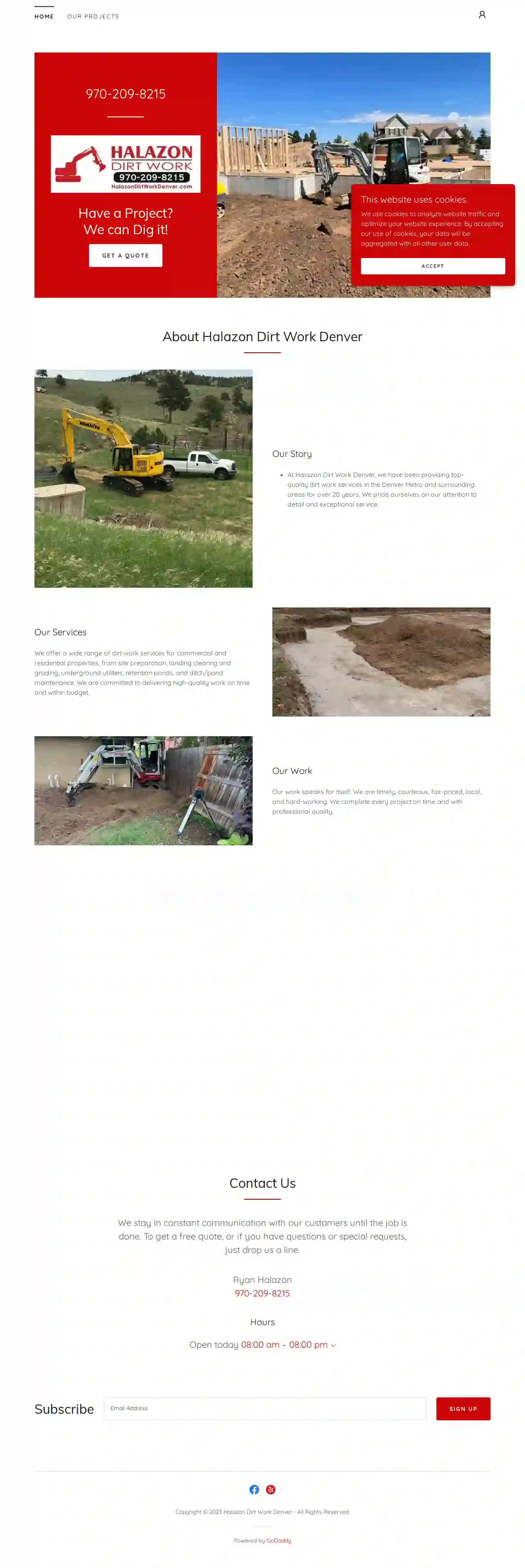
Halazon Dirt Work Denver
53 reviewsDenver, US- Services
- Why Us?
Get Quote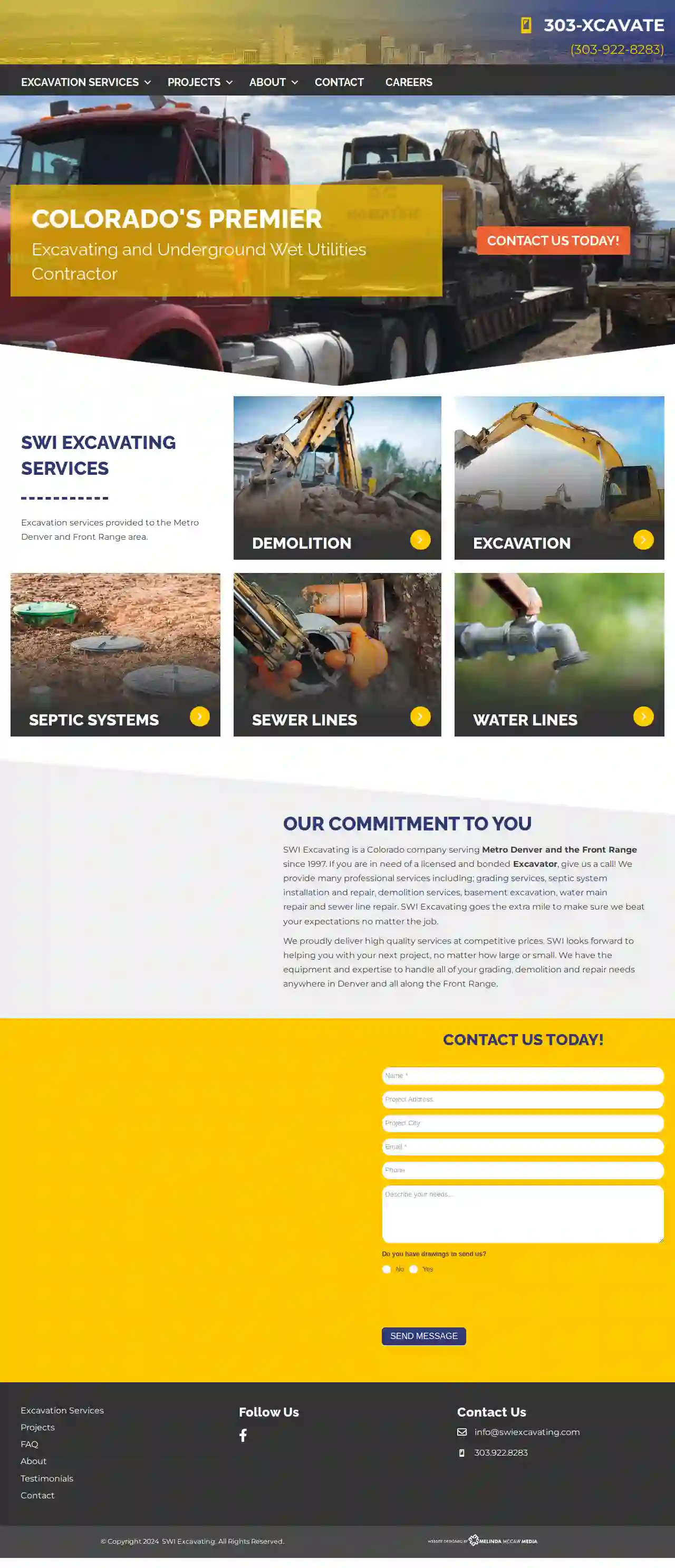
SWI Excavating
4.724 reviewsDenver, US- Services
- Why Us?
Get Quote
Over 3,943+ Excavation Pros registered
Our excavation contractors operate in Denver and surrounding areas!
ExcavationHQ has curated and vetted the Best Excavation Companies arround Denver. Find a top & reliable contractor today.
Frequently Asked Questions About Excavation Contractors
- Planning and Surveying: Defining the excavation area, marking utility lines, and determining the required depth and grade.
- Site Preparation: Clearing vegetation, removing obstacles, and ensuring site accessibility.
- Excavation: Using appropriate equipment (excavators, backhoes, etc.) to remove earth and create the desired excavation.
- Hauling and Disposal: Transporting excavated material to designated disposal sites, complying with environmental regulations.
- Backfilling and Compaction: Refilling the excavation with suitable material and compacting it to achieve the required density and stability.
- Grading and Finishing: Leveling and shaping the surface to the final grade for landscaping or construction.
- Hauling to Designated Disposal Sites: Transporting excavated material to approved landfills or recycling centers.
- Recycling or Reuse: If suitable, some excavated soil might be recycled for other projects or reused on-site for landscaping or backfilling.
- Complying with Regulations: Adhering to local and environmental regulations for soil disposal to prevent contamination or illegal dumping.
- Clear the Area: Remove any obstacles, including vehicles, outdoor furniture, landscaping features, or structures, from the excavation zone and surrounding area.
- Mark Existing Features: Identify and mark underground utilities, septic tanks, sprinkler systems, or other buried elements you want to protect.
- Protect Landscaping: Use tarps or fencing to shield trees, shrubs, gardens, or other landscaping elements from damage.
- Provide Access: Ensure the excavation contractor has clear access to the work area, including gates wide enough for equipment.
- Discuss Logistics: Coordinate with the contractor regarding parking arrangements, material delivery, and any special instructions or concerns you might have.
- Spring and Fall: Often considered favorable due to moderate temperatures and drier soil conditions.
- Summer: Can be suitable, but hot weather can make working conditions challenging and might require additional measures (shade, hydration) for workers.
- Winter: Excavation in winter can be more difficult due to frozen ground, snow, and potential delays caused by inclement weather. It might also require specialized equipment or techniques.
What is the excavation process?
How do you handle soil disposal after excavation?
How do I prepare my property for excavation?
What is the best time of year for excavation?
What is the excavation process?
- Planning and Surveying: Defining the excavation area, marking utility lines, and determining the required depth and grade.
- Site Preparation: Clearing vegetation, removing obstacles, and ensuring site accessibility.
- Excavation: Using appropriate equipment (excavators, backhoes, etc.) to remove earth and create the desired excavation.
- Hauling and Disposal: Transporting excavated material to designated disposal sites, complying with environmental regulations.
- Backfilling and Compaction: Refilling the excavation with suitable material and compacting it to achieve the required density and stability.
- Grading and Finishing: Leveling and shaping the surface to the final grade for landscaping or construction.
How do you handle soil disposal after excavation?
- Hauling to Designated Disposal Sites: Transporting excavated material to approved landfills or recycling centers.
- Recycling or Reuse: If suitable, some excavated soil might be recycled for other projects or reused on-site for landscaping or backfilling.
- Complying with Regulations: Adhering to local and environmental regulations for soil disposal to prevent contamination or illegal dumping.
How do I prepare my property for excavation?
- Clear the Area: Remove any obstacles, including vehicles, outdoor furniture, landscaping features, or structures, from the excavation zone and surrounding area.
- Mark Existing Features: Identify and mark underground utilities, septic tanks, sprinkler systems, or other buried elements you want to protect.
- Protect Landscaping: Use tarps or fencing to shield trees, shrubs, gardens, or other landscaping elements from damage.
- Provide Access: Ensure the excavation contractor has clear access to the work area, including gates wide enough for equipment.
- Discuss Logistics: Coordinate with the contractor regarding parking arrangements, material delivery, and any special instructions or concerns you might have.
What is the best time of year for excavation?
- Spring and Fall: Often considered favorable due to moderate temperatures and drier soil conditions.
- Summer: Can be suitable, but hot weather can make working conditions challenging and might require additional measures (shade, hydration) for workers.
- Winter: Excavation in winter can be more difficult due to frozen ground, snow, and potential delays caused by inclement weather. It might also require specialized equipment or techniques.